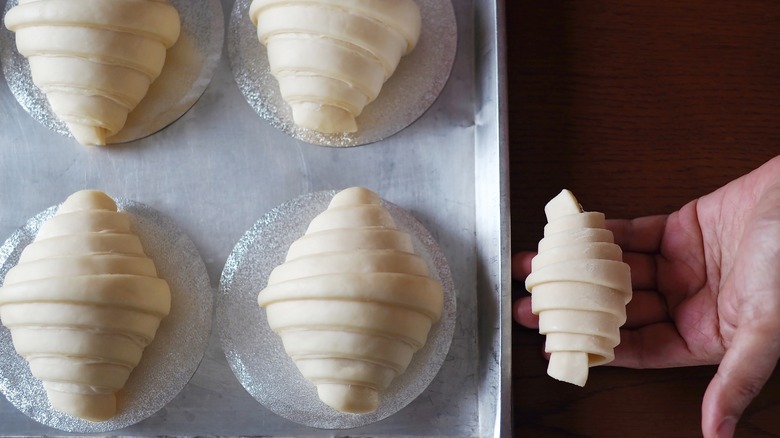The Offbeat Appliance That Helped Julia Child Make Perfect Croissants
A well-made croissant is about as close to culinary perfection as you can get, with its buttery flavor and flaky, soft interior juxtaposed with the crisp, browned exterior. However, anyone who has ever attempted to whip up a batch at home knows that it is not exactly for the faint of heart. Croissants are relatively time-consuming to craft from scratch and can be quite finicky. You really need to know how to handle each step of the process if you want flawless results. Iconic culinary personality Julia Child, who was known for her fearless attitude toward cooking, had one tip that might help make the process a little less intimidating.
In an episode of "The French Chef," while making a batch of croissants, Child suggested a few outside-the-box ways to get a faster rise on your croissant dough. She clarified that all you really need is for the dough to rise at a temperature of around 70 to 85 degrees Fahrenheit. While traditionalists will stick their covered dough in the warming drawer of the oven, Child mentioned the option to use a heating pad placed atop the counter to keep the dough at the right temperature. She explained how something like an electric blanket, or even just a pillow placed atop a radiator, would do the trick just as well.
Why the rise is so important
Julia Child's unconventional choice of an appliance to keep the dough warm may raise a few eyebrows, but in reality, it truly doesn't matter where the extra heat comes from — the important thing is that the dough roughly doubles in size by the end of the rise. Or, if you prefer a more tactile measure, the dough jiggles slightly when you shake the bowl. As she specifies in the clip, all you need to ensure is that your heating implement doesn't surpass 85 degrees Fahrenheit, as that could harm the yeast.
Though waiting for the dough to rise may seem like just another step in the endless croissant preparation ordeal, it's important to the texture of your croissants. The rising process allows the yeast to make air pockets within the dough. And, you want to get it just right — both not allowing it to rise enough, as well as allowing it to rise too much, compromise the texture and final quality of your croissants.
Ultimately, keep in mind that patience is the name of the game with croissants. Once you've completed the initial rise for the dough, you still need to go through the process of folding sheets of butter into the dough and allowing the shaped croissants to rise for an additional 60 to 90 minutes before baking.

